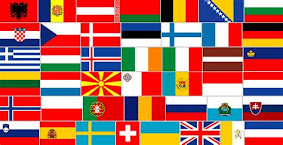Some occurrences have a touch of unreality about them. They seem so unlikely that an alternative explanation must be in order. Indeed, last week’s Oslo massacre has many speculating about a vast conspiracy of some sort orchestrated by a shadowy, all-powerful cabal to manipulate world opinion in some nefarious manner.
Yet the simplest explanation of events—however seemingly outlandish—is usually the parsimonious one. Thus, it appears that Anders Behring Breivik—this preening 32-year-old Nordic pretty boy with a narcissistic proclivity to photograph himself playing dress-up—really did commit one of the worst atrocities in recent Scandinavian history all by his lonesome.
In fact, it seems that blond, baby-faced Breivik, who spent the last few months preparing a rambling online manifesto, which reaches new levels of sheer plodding length and mind-numbing tedium, is both the sole bomb-maker and lone gunman in the bloody affair that left nearly 100 people dead at or near the Norwegian capital over the course of a few horrific hours of carnage and terror last Friday. He alone, without assistance, built and detonated the car bomb that killed seven people in downtown Oslo. Then, rather more notoriously, he alone machine-gunned scores of defenseless high school and college-aged kids on the island of Utoya, where he posed as a security guard, won their trust and pretended to be their protector before ruthlessly massacring them.
The brutality of these crimes is breathtaking, as is the remorseless efficiency with which they were carried out by a man with a single-minded determination to shed as much blood as possible. It’s the sort of event that deserves at least a moment of reverential regard, a doffing of one’s cap or lowering of one’s flag, if you will. Yet Breivik had barely surrendered to police, and his victim’s screams still echoed in the air when people started to chatter, not about the immense evil of the act itself, but of the possible fallout of the rampage. The blood was still fresh on the ground, the bodies not yet carted away, and already the Oslo massacre was being scrutinized, by representatives of both Left and Right-leaning organizations, with an eye towards gaining political advantage.
Early suspicions were that the attacks had been carried out by radical Islamists, a scenario which had various far-rightists salivating, anticipating a tragedy to exploit to further their crusades against mass Third World immigration. But then it turned out that the perpetrator of the killing spree was a kind of Calvin Klein-model version of Timothy McVeigh, a man with the homicidal proclivities of a Dylan Klebold accompanied by the politics of Geert Wilders, together with the metrosexual photogenicity of a Ralph Fiennes. At which point, of course, the lefties pounced, and their shameless efforts to tar and feather their opposition with complicity in mass murder continues unabated.
In the wake of such irresponsible rhetoric, I think one point needs to be expressed loudly and strongly: there is no greater poverty of spirit than one which adopts a partisan mindset towards human atrocities. The killing of a hundred innocent civilians must be viewed with horror, even if we happen to like the political mindset of their murderer and despise the general outlook of those murdered. And yes, mass murder of likely “cultural Marxists” and “multicultural elitists” is still mass murder. To see things otherwise is to forfeit our humanity. They Live may be an inspired little B-movie, but in real life, our opponents aren’t sinister, bloodsucking aliens posing as humans; they don’t merit indiscriminate slaughter.
And while it is fine to ponder the likely political ramifications—both in Europe and elsewhere—of Breivik’s highly impolitic behavior, we must not let a crime like this become a political symbol of any kind. People commit unspeakable acts for a whole host of reasons: sometimes personal, sometimes political, sometimes as an expression of nihilistic rage and hopelessness. But in every case, their crimes are not ultimately reducible to any particular ideology or mindset; their depredations are, instead, deeply repugnant manifestations of human depravity, of a dark, vicious force within which tempts us to dehumanize our fellow man, and indulge in orgiastic, cathartic violence against others.
Many on the Left will attempt to construe Breivik as, in some way, representative of the typical right-wing, nationalistic, immigration-restrictionist voter; it’s a slippery slope, they’ll argue, between opposing mass immigration and spraying a bunch of terrified teenagers with machine gun fire. Such an argument is obviously specious as well as being outrageously disingenuous. Then again, many right-wingers would have employed a similarly logically fallacious guilt-by-association strategy if the Oslo killer had been a radical Muslim. In fact, even if it’s true that open immigration is a pernicious and failed policy, the story of one homicidal Islamist on a rampage doesn’t amount to an argument in itself.
Many thousands of devout Muslim immigrants live peaceably in Europe today. Even if we believe that their continued presence is ultimately untenable, it won’t do to define this entire population by the very worst of their lot.
Finally, AltRightists really need to stop moaning and groaning about how things are really going to get bad for us now. In the first place, such reflexive alarmism is annoyingly whiny. In the second place, it is thoroughly misguided. The attempt of the Left to smear all Rightists as genocidal Breiviks-in-training will fail. It’s rhetorically quite weak. Breivik is, after all, just one man, and his actions are too extreme to be viewed as representative of anyone but himself.
But more importantly, dwelling so hard on the consequences of Breivik’s depredations, while paying mere lip service to his bloody deeds, does an injustice to the enormity of his crimes. It is undignified, unmanly, and crass. The real story isn’t the fallout of the massacre, it is the massacre itself. All people of good will, of every political stripe—including the alternative Right—should acknowledge the events of Friday, July 22 as a shattering human tragedy, nothing more, nothing less. Some things are—or at least ought to be—beyond politics.
Yet the simplest explanation of events—however seemingly outlandish—is usually the parsimonious one. Thus, it appears that Anders Behring Breivik—this preening 32-year-old Nordic pretty boy with a narcissistic proclivity to photograph himself playing dress-up—really did commit one of the worst atrocities in recent Scandinavian history all by his lonesome.
In fact, it seems that blond, baby-faced Breivik, who spent the last few months preparing a rambling online manifesto, which reaches new levels of sheer plodding length and mind-numbing tedium, is both the sole bomb-maker and lone gunman in the bloody affair that left nearly 100 people dead at or near the Norwegian capital over the course of a few horrific hours of carnage and terror last Friday. He alone, without assistance, built and detonated the car bomb that killed seven people in downtown Oslo. Then, rather more notoriously, he alone machine-gunned scores of defenseless high school and college-aged kids on the island of Utoya, where he posed as a security guard, won their trust and pretended to be their protector before ruthlessly massacring them.
The brutality of these crimes is breathtaking, as is the remorseless efficiency with which they were carried out by a man with a single-minded determination to shed as much blood as possible. It’s the sort of event that deserves at least a moment of reverential regard, a doffing of one’s cap or lowering of one’s flag, if you will. Yet Breivik had barely surrendered to police, and his victim’s screams still echoed in the air when people started to chatter, not about the immense evil of the act itself, but of the possible fallout of the rampage. The blood was still fresh on the ground, the bodies not yet carted away, and already the Oslo massacre was being scrutinized, by representatives of both Left and Right-leaning organizations, with an eye towards gaining political advantage.
Early suspicions were that the attacks had been carried out by radical Islamists, a scenario which had various far-rightists salivating, anticipating a tragedy to exploit to further their crusades against mass Third World immigration. But then it turned out that the perpetrator of the killing spree was a kind of Calvin Klein-model version of Timothy McVeigh, a man with the homicidal proclivities of a Dylan Klebold accompanied by the politics of Geert Wilders, together with the metrosexual photogenicity of a Ralph Fiennes. At which point, of course, the lefties pounced, and their shameless efforts to tar and feather their opposition with complicity in mass murder continues unabated.
In the wake of such irresponsible rhetoric, I think one point needs to be expressed loudly and strongly: there is no greater poverty of spirit than one which adopts a partisan mindset towards human atrocities. The killing of a hundred innocent civilians must be viewed with horror, even if we happen to like the political mindset of their murderer and despise the general outlook of those murdered. And yes, mass murder of likely “cultural Marxists” and “multicultural elitists” is still mass murder. To see things otherwise is to forfeit our humanity. They Live may be an inspired little B-movie, but in real life, our opponents aren’t sinister, bloodsucking aliens posing as humans; they don’t merit indiscriminate slaughter.
And while it is fine to ponder the likely political ramifications—both in Europe and elsewhere—of Breivik’s highly impolitic behavior, we must not let a crime like this become a political symbol of any kind. People commit unspeakable acts for a whole host of reasons: sometimes personal, sometimes political, sometimes as an expression of nihilistic rage and hopelessness. But in every case, their crimes are not ultimately reducible to any particular ideology or mindset; their depredations are, instead, deeply repugnant manifestations of human depravity, of a dark, vicious force within which tempts us to dehumanize our fellow man, and indulge in orgiastic, cathartic violence against others.
Many on the Left will attempt to construe Breivik as, in some way, representative of the typical right-wing, nationalistic, immigration-restrictionist voter; it’s a slippery slope, they’ll argue, between opposing mass immigration and spraying a bunch of terrified teenagers with machine gun fire. Such an argument is obviously specious as well as being outrageously disingenuous. Then again, many right-wingers would have employed a similarly logically fallacious guilt-by-association strategy if the Oslo killer had been a radical Muslim. In fact, even if it’s true that open immigration is a pernicious and failed policy, the story of one homicidal Islamist on a rampage doesn’t amount to an argument in itself.
Many thousands of devout Muslim immigrants live peaceably in Europe today. Even if we believe that their continued presence is ultimately untenable, it won’t do to define this entire population by the very worst of their lot.
Finally, AltRightists really need to stop moaning and groaning about how things are really going to get bad for us now. In the first place, such reflexive alarmism is annoyingly whiny. In the second place, it is thoroughly misguided. The attempt of the Left to smear all Rightists as genocidal Breiviks-in-training will fail. It’s rhetorically quite weak. Breivik is, after all, just one man, and his actions are too extreme to be viewed as representative of anyone but himself.
But more importantly, dwelling so hard on the consequences of Breivik’s depredations, while paying mere lip service to his bloody deeds, does an injustice to the enormity of his crimes. It is undignified, unmanly, and crass. The real story isn’t the fallout of the massacre, it is the massacre itself. All people of good will, of every political stripe—including the alternative Right—should acknowledge the events of Friday, July 22 as a shattering human tragedy, nothing more, nothing less. Some things are—or at least ought to be—beyond politics.




























No comments:
Post a Comment
Your comment will appear after it has been checked for spam, trolling, and hate speech.